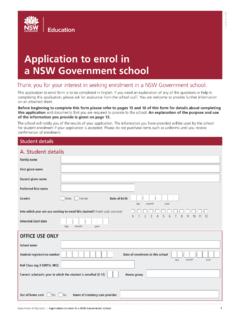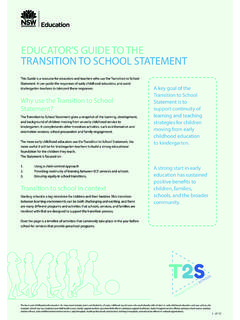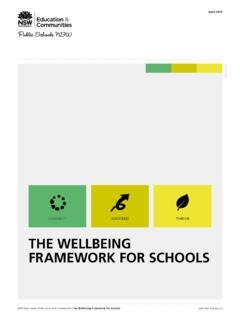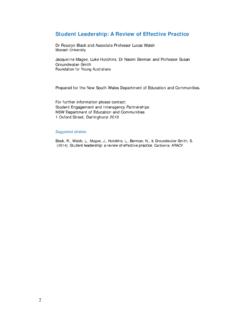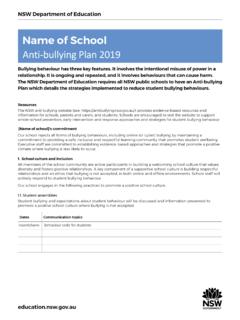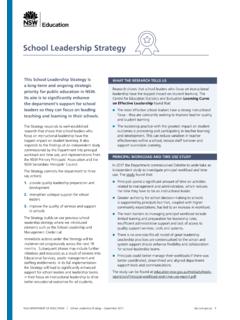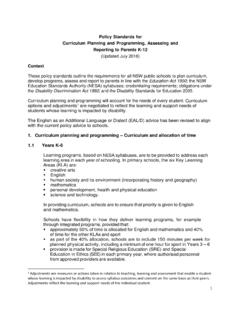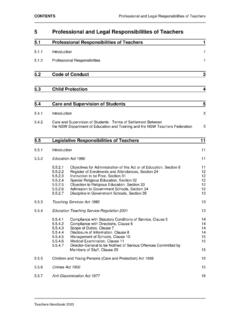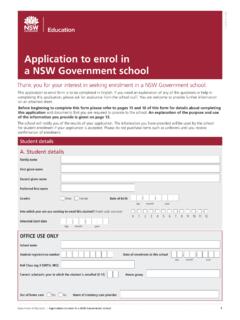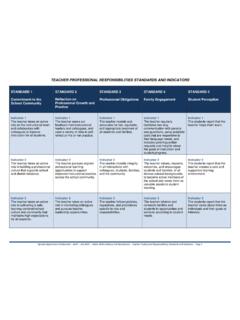Transcription of School Excellence Framework Version 2 July 2017
1 School Excellence FrameworkVersion 2 | July 2017 IntroductionNSW public schools are committed to the pursuit of Excellence and the provision of high quality educational opportunities for each and every child. We prepare young people for rewarding lives in an increasingly complex world. Our vision is improved performance in every School , for every student, every teacher, every leader, every School Excellence Framework supports all NSW public schools in their pursuit of Excellence by providing a clear description of the key elements of high quality practice across the three domains of learning, teaching and Framework describes 14 elements across these three domains which define the core business of excellent schools in three stages. Each year, schools will assess their practices against the Framework to inform their School plans and annual reports. The description of Excellence in the Framework supports schools as they engage their communities in the development of a shared vision, the identification of strategic priorities, and the ongoing tracking of progress towards focus is on studentsIn our schools, every child is known, valued and cared for.
2 Parents want the very best for their children. In education, this means teachers and schools with a commitment to nurture, guide, inspire and challenge students to find the joy in learning, to build their skills and understanding, and to make sense of their world. In the early years, it means having confidence that each individual child will be known and understood, and their individual potential students progress, it means knowing that they are well supported as increasingly self-motivated learners confident and creative individuals, with the personal resources for future success and in learningIn our schools, young people will develop foundation skills in literacy and numeracy, strong content knowledge and the ability to learn, adapt and be responsible citizens. The journey to Excellence for students in NSW public schools begins during the first important weeks of Kindergarten. Every child brings a different set of experiences, knowledge and skills to School with them, and understanding these is essential to planning their individual learning paths.
3 From the earliest School days and throughout their time at School , teachers use information about individual students capabilities and needs to plan for students learning so as to engage them in rich learning experiences, developing the vital skills for flourishing now and in future years. By sharing information about learning development, teachers work in partnership with parents as active participants in their children s education. At the other end of schooling, teachers and schools support students to make successful transitions to future learning and employment, with the skills to make informed contributions as citizens and in teachingIn our schools, teachers demonstrate personal responsibility for improving their teaching practice in order to improve student learning. Student learning is underpinned in excellent schools by high quality teaching. Teaching in these schools is distinguished by universally high levels of professionalism and commitment.
4 Lessons and learning opportunities are engaging and teaching strategies are evidence-based. Individually and collaboratively, teachers evaluate the effectiveness of their teaching practices, including sophisticated analysis of student engagement, learning growth and outcomes, to plan for the ongoing learning of each student in their care. Teachers take shared responsibility for student improvement and contribute to a transparent learning culture, including through the observation of each other s in leadingIn our schools, School leaders enable a self- sustaining and self-improving community that will continue to support the highest levels of learning as a lasting legacy of their contributions. Strong, strategic and effective leadership is the cornerstone of School Excellence . Excellent leaders have a commitment to fostering a School -wide culture of high expectations and a shared sense of responsibility for student engagement, learning, development and success.
5 Students benefit from the School s planned and proactive engagement with parents and the broader community. Leaders in excellent schools ensure that operational issues, such as resource allocation and accountability requirements, serve the overarching strategic vision of the School schools that excel, the School culture is strongly focused on learning, the building of educational aspiration and ongoing performance improvement throughout the School CULTURETHEMESDELIVERINGSUSTAINING AND GROWINGEXCELLINGHigh expectationsProgress in learning and achievement is identified and acknowledged. The aspirations and expectations of students and parents are known and inform planning for is demonstrated commitment within the School community that all students make learning with parents and students support clear improvement aims and planning for whole School community demonstrates aspirational expectations of learning progress and achievement for all students, and is committed to the pursuit of partnerships in learning with parents and students mean students are motivated to deliver their best and continually and continuity of learningThe School actively plans for student transitions ( into Kindergarten; Y6 to Y7; Y10 to Y11).
6 The School clearly communicates its transition activities to the School School collects and analyses information to inform and support students successful School seeks to collaborate with parents of students whose continuity of learning is at School engages in strong collaborations between parents, students and the community that inform and support continuity of learning for all students at transition points, including highly mobile students and students with atypical regularly and accurately monitor attendance and take prompt action to address issues with individual School community celebrates regular and improved data is regularly analysed and is used to inform planning. Whole of School and personalised attendance approaches are improving regular attendance rates for all students, including those at , parents and the community work together to support consistent and systematic processes that ensure student absences do not impact on learning schools that excel, there is a strategic and planned approach to develop whole School wellbeing processes that support the wellbeing of all students so they can connect, succeed, thrive and learn.
7 WELLBEINGTHEMESDELIVERINGSUSTAINING AND GROWINGEXCELLINGC aring for studentsThe wellbeing of students is explicitly supported by identified student can identify a staff member to whom they can confidently turn for advice and assistance at School is organised so that all students have regular opportunities to meet with an identified staff member who can provide advice, support and assistance to help students fulfil their planned approach to wellbeingStudents, staff and the community recognise that student wellbeing and engagement are important conditions for School plans for and monitors a whole School approach to student wellbeing and School collects, analyses and uses data including valid and reliable student, parent and staff surveys/feedback to monitor and refine a whole School approach to wellbeing and engagement, to improve School has implemented evidence-based change to whole School practices, resulting in measurable improvements in wellbeing and engagement to support learning needsThe needs of all students are explicitly addressed in teaching and learning and evidence-based approaches, programs and assessment processes identify, regularly monitor and review individual student learning is School -wide, collective responsibility for student learning and success, which is shared by parents and students.
8 Planning for learning is informed by sound holistic information about each student s wellbeing and learning needs in consultation with School s wellbeing approach focuses on creating an effective environment for learning. Teachers and other School staff explicitly communicate expectations of behaviour across School of behaviour are co-developed with students, staff and the community and are designed to ensure effective conditions for learning. They are explicitly, consistently and supportively applied across the , respectful relationships are evident and widespread among students and staff and promote student wellbeing to ensure optimum conditions for student learning across the whole schools that excel, an integrated approach to quality teaching, curriculum planning and delivery, and assessment promotes learning Excellence and responsiveness in meeting the needs of all AND GROWINGEXCELLINGC urriculum provisionThe School offers a curriculum that meets requirements of the Department of Education and the NSW Education Standards Authority and provides equitable academic opportunities for all School s curriculum provision and evidence-based teaching practices provide a high expectations Framework , within which all students effectively develop their knowledge.
9 Understanding and School monitors and reviews its curriculum provision to meet changing requirements of the School s curriculum provision supports high expectations for student learning. The curriculum is enhanced by learning alliances with other schools or organisations, where useful and practicable. Students learning and courses of study are monitored longitudinally (for example K-2; K-6; 7-12) to ensure continued challenge and maximum and learning programsTeaching and learning programs describe what all students are expected to know, understand and and learning programs describe expected student progression in knowledge, understanding and skill and the assessments that measure and learning programs are dynamic, showing evidence of revisions based on feedback on teaching practices, consistent and reliable student assessment and continuous tracking of student progress and of curriculum delivery within classrooms happens for some students with particular identified needs.
10 The parents of affected students are advised about adjustments differentiate curriculum delivery to meet the needs of students at different levels of achievement, including adjustments to support learning or increase challenge. Most students can articulate their learning and understand what they need to learn next to enable continuous and learning programs across the School show evidence that they are adjusted to address individual student needs, ensuring that all students are challenged and all adjustments lead to improved learning. Teachers involve students and parents in planning to support learning, and share expected schools that excel, consistent School -wide practices for assessment are used to monitor, plan and report on student learning across the curriculum. Formative assessment is integrated into teaching practice in every classroom, confirming that students learn what is AND GROWINGEXCELLINGF ormative assessmentTeachers collect and use assessment data that monitors achievements and identifies gaps in learning to inform planning for particular student groups and individual routinely use evidence of learning, including a range of formative assessments to inform their teaching, adapt their practice and meet learning needs of is used flexibly and responsively as an integral part of daily classroom instruction.
